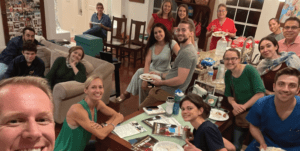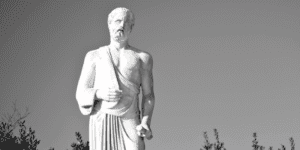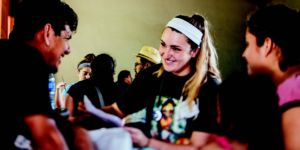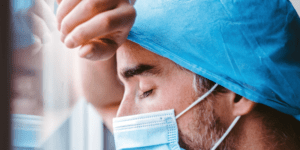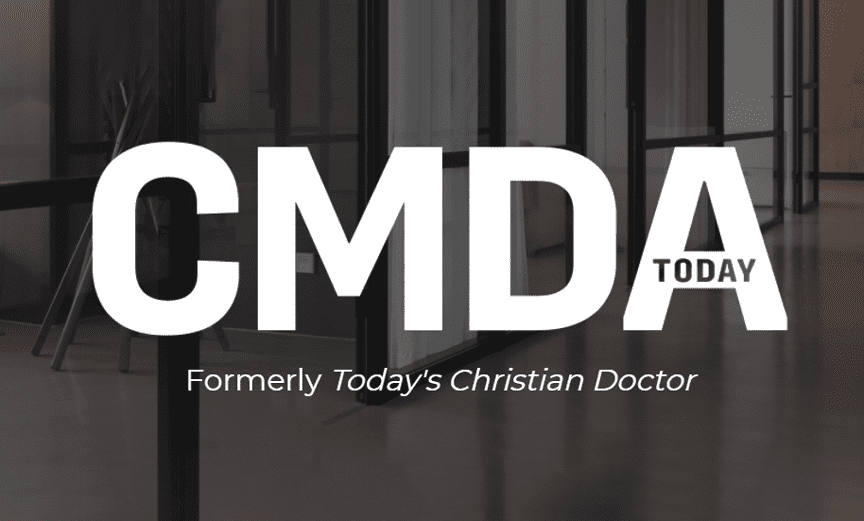
After Ebola: Confronting the Trauma
In the closing months of 1989, a brutal civil war erupted in Liberia and soon engulfed the small West African country. At the time, T. Abraham Browne was in high school, and the senseless killings forced him and his siblings to flee for their lives to escape the bloodshed. They reached a refugee camp where Abraham would spend the next 10 years.
by Nancy Writebol, CNA, SIM Global Trauma Healing Coordinator, as told to Richard Greene
In the closing months of 1989, a brutal civil war erupted in Liberia and soon engulfed the small West African country. At the time, T. Abraham Browne was in high school, and the senseless killings forced him and his siblings to flee for their lives to escape the bloodshed. They reached a refugee camp where Abraham would spend the next 10 years.
If that horror wasn’t enough for someone so young to experience, Abraham would face another country-wide crisis that swept through Liberia about 25 years later. This time it was Ebola. Abraham said, “Compared to the war, it was even more deadly because Ebola was an unseen enemy. It was just by touch and then you were infected and that was it.”
So many family members lost their lives. They lost their loved ones. Abraham’s little sister contracted Ebola. When Abraham got word, he rushed to go see her. Her eyes were swollen when he arrived. Tragically, she died.
“It was the most difficult part of our lives,” Abraham said. “We tried to withstand.” As he recalled this heart-rending period, tears welled in his eyes, and his voice cracked with emotion. Then he wiped the tears with his fingers. “I never thought I would have the strength and the courage to say, ‘Okay, I can still go ahead.’”
Then Abraham discovered the Trauma Healing Program. The ministry was being offered as a collaborative effort between the Evangelical Church of Liberia (ECOL) and SIM, an international Christian mission organization that has been working in West Africa since 1893.
“When I came to the trauma healing [training], there was a day for taking our pain to the cross and explaining from our heart what we went through,” Abraham said. “As I stood there and tears came to my eyes, it was like I had something on my head, and it was being removed. I believe I was de-traumatized during that first phase of the training.”
Abraham went on to say, “SIM touched my life through that program. I was a different man than before. I want to say, ‘thank you,’ because it made me and other people a new person, able to now withstand difficult circumstances.”
We praise God for all He has done in Abraham’s life. Today he’s faithfully serving as the district secretary for ECOL. What an amazing testimony!
God is using this powerful Bible-based Trauma Healing Ministry to enable men, women, youth and children to be restored through Jesus Christ. Trauma Healing provides training, resources and support to help the church respond to communities around the world suffering from trauma. In as much as God has used this ministry in the context of war, epidemics and disasters, He is also using it to engage with the “everyday” wounds of grief, domestic violence, addiction, sexual abuse, abandonment, ethnic conflict, infertility, abortion, HIV or crime. As the church engages meaningfully with people’s pain, we have seen lives changed. Built on a solid foundation of mental health best practices and biblical principles, Trauma Healing’s model leads to sustainable trauma care in any context, with real-life stories to help people connect the teaching with their circumstances.
“Sadly, the body of Christ has often failed to see trauma as a place of ministry. If we survey the extensive natural disasters in our time—earthquakes, hurricanes and tsunamis, combined with victims who have suffered from human atrocities of violent inner cities, wars, genocides, trafficking, rapes and child abuse—we would see a staggering number. To look at suffering humanity would lead to the realization that trauma is perhaps the greatest mission field of the 21st century. The wounds of trauma are not visible, their effects are!”[1]
The core program at SIM is adapted from the American Bible Society’s workbook titled “Healing the Wounds of Trauma.” The material came about when people who had terrible things happen to them, asked the question, “Can God heal them?” These are the questions that the authors of the book were asking in the late 1990s as they saw people suffering from war. They were all members then on staff with SIM, living and working in Africa.
In 2001, a group of people met to write the lessons. The group included mental health professionals, Bible translators, Scripture engagement consultants and African church leaders who had experienced war. The lessons were tested in war zones and were first published in 2004. Trauma Healing is now in 94 countries with more than 8,000 facilitators.
I personally became involved in trauma healing after surviving Ebola and before returning to Liberia in 2015. Five years after I contracted the disease and was healed by God’s amazing grace, my husband David and I visited Emory University Hospital in Atlanta, Georgia where I was treated in their high-level bio-containment unit. Upon arriving in Atlanta, I remember reflecting on those difficult days in Liberia and feeling thankful I was walking off the airplane instead of taking an ambulance ride and being wheeled into the unit on a stretcher.
I was one of three Americans who contracted the virus at SIM’s ELWA Hospital in Monrovia, Liberia during the height of the 2014 epidemic. As a hygienist, I was out of direct contact with patients, so my diagnosis came as a surprise.
I was isolated at our home and then evacuated to the U.S., where I was cared for in a custom-built treatment unit at Emory University Hospital. I arrived there a few days after the world watched Dr. Kent Brantly, a medical missionary with Samaritan’s Purse, walk out of the ambulance!
We are extremely grateful for the Emory team of physicians, nurses and other staff who so graciously cared for us. It was a blessing that Kent and I were there at the same time. We talked with each other by phone, encouraging each other in our journey.
That God would heal me, and that I would walk out of the hospital on August 19, 2014, humbles me. I still remember holding David’s hand, our first physical contact in 24 days.
As we recovered from the crisis in the Charlotte, North Carolina area, the Ebola epidemic raged on in Liberia. Despite all that David and I had endured, our hearts remained thousands of miles away, emotionally committed to our Liberian brothers and sisters who were fighting for their lives.
At the time, I was reading Risk is Right by John Piper. I was struck by what he writes in the first chapter:
“There are a thousand ways to magnify Christ in life and death. None should be scorned. All are important. But none makes the worth of Christ shine more brightly than sacrificial love for other people in the name of Jesus. If Christ is so valuable that the hope of his immediate and eternal fellowship after death frees us from the self-serving fear of dying and enables us to lay down our lives for the good of others, such love magnifies the glory of Christ like nothing else in the world.”[2]
“The early Christians gave their property and their lives for sake of others because they knew that on the other side of death Jesus would be their great reward.”[3]
That said it for us. We returned to Liberia, first, because of our love for Christ and then, second, because of our love for others.
As we prayed, read God’s Word and sought counsel, we were reminded again and again of our calling by God to serve Him in Liberia. We were compelled by God’s great love to return, to live out the gospel in the power of the Holy Spirit, making disciples who trust Him and obey Him.
I think that having gone through Ebola myself, there’s an identification with the people that I didn’t have before. Some Liberians have even told me, “If we had been you, we wouldn’t have come back.” Many times, we have heard, “Thank you for coming back.”
David and I returned to Liberia in the spring of 2015, even before the crisis was declared over. David assumed the country directorship for SIM, while I went back as a trained trauma healing facilitator to help minister to Ebola survivors and the community at large, to confront deep emotional and psychological wounds from their encounters with the disease.
But not just from Ebola. We discovered countless numbers of patients, just like Abraham, who not only were suffering from the trauma of Ebola, but they were also suffering from the ravaging effects of 14 nightmarish years of civil war that claimed the lives of at least 250,000 people. My colleagues and I began leading trauma healing sessions while also training other facilitators. Though we are not trained psychologists, we are confident in the biblical resources we’re providing through the course.
Identification, relationship and listening are vital. Most people need to say aloud what happened, how they feel and the hardest part of their trauma. Telling the story in a place they feel safe can lessen the hold of the traumatic experience. Sometimes, it’s the first opportunity to describe their experience.
Then we get to witness miracles in the making! As the participants pray and give their pain to Christ, they begin to find healing. Hope returns as God mends their hearts. Grieving is a journey and it takes courage to face the process.
I genuinely believe the Lord has used my battle with Ebola to open doors to speak into the lives of hurting people, not just in Liberia but elsewhere. We have relationships we would not have had if this had not happened.
Then there’s the outreach to an almost unexpected subset of people who have needed special attention—the dozens of men who labored in the national crematory during the Ebola crisis. Without question, the gruesome service these men performed directly reduced the deadly spread of the disease. Instead of being given a traditional washing and burial, the contagious bodies of the victims were received from the treatment units or communities and incinerated. As a result, the Liberian culture shunned these men, who were dubbed “Ebola Erasers.” To add to their shame, families and communities turned their backs on them. Many lost their jobs. To cope, some turned to alcohol and drugs.
The Evangelical Church of Liberia reached out to these men and invited them to a special luncheon to honor their service and to thank them. We teamed and trained ECOL leaders to hold a trauma healing group for the men.
They experienced huge grief. At first, they were reluctant to discuss their pain and dilemma. They bottled it up. About a year later, though, they approached us and were no longer hesitant. They attended the healing groups, and most are doing well. Please pray for these men as they process the painful situations they have experienced in their lives. Many are non-believers, and they need Jesus!
In this last year, SIM asked me to step into the position of Global Trauma Healing Coordinator. My role now extends far beyond the borders of Liberia. This has involved helping train lay leaders and pastors in the Democratic Republic of the Congo (DRC), which is struggling to get on top of its Ebola outbreak. Countless issues make containment of Ebola difficult, including the rebel attacks on healthcare workers. We must raise the level of awareness and be willing to respond to the many heart wounds that those living in the DRC are carrying.
Trauma Healing also seeks to reach oral communities, children, teens, refugees, those in prison and various others as the need arises.
Wherever adults suffer, children suffer doubly. The workbook for the children is called Healing Hearts Club. Each of the 10 lessons includes a Bible story and a composite real-life story about the experiences of “Sami and Rose,” so children can see the effects of trauma, learn how to work through their emotional and spiritual pain, and experience God’s love for them.
Lesson 1 is “I am Important to God.” The lesson builds an atmosphere where children feel safe and where they feel their needs can be shared and brought to God for healing. Children learn how special they are, and they learn that God sees them as individuals of worth and value created in His image.
In a children’s group, six little girls were all crowded around their teacher sitting on the floor as she was telling the story. She explained to the girls that they were created in God’s image and they were special to Him, and she shared the story of creation and expressed that when God finished creating the world, He looked at everything and said, “It is very good.” She went on to tell the girls how much God loved them. When she finished talking, one little girl said, “Ahh, I didn’t know that God made me or that I am special.” “Yes,” replied her teacher, “He loves you very much,” to which the little girl replied, “NOBODY ever told me this” As the week continued, it was a blessing to see how each lesson helped this young girl process the pain she was caring and meet Jesus as her Savior.
I thank the leaders of CMDA for allowing me this privilege to let their members know of the importance of the Trauma Healing Ministry and the impact this initiative has been making for SIM and other global partners. Please join us in making a lasting difference around the world.
Pray for us as we continue to reach people like Abraham and Rachel. To learn more about SIM’s Trauma Healing Ministry, visit www.simusa.org/traumahealing. If you have questions and would like to connect, please contact me at [email protected].
About the Author
Nancy Writebol, CNA, and her husband David joined SIM in 2013. After 14 years of ministering to orphans and vulnerable children in Zambia and Ecuador, God led them to serve with SIM in Monrovia, Liberia. Nancy and David have two married sons and seven grandchildren. During the Ebola outbreak in March 2014, ELWA Hospital in Monrovia assumed the role of the Ebola Consolidated Case Management Center. Nancy volunteered as a member of the joint SIM/Samaritan’s Purse crisis team. Nancy was one of the first Americans to become infected with the Ebola virus in July 2014. Nancy and Dr. Kent Brantly, a physician who worked in the same hospital, were evacuated and recovered at Emory University in Atlanta, Georgia after receiving an experimental serum called ZMapp. Nancy and David returned to Liberia in March 2015. She served as the Personnel Coordinator for SIM (2013) and the West Africa Coordinator for Trauma Healing from 2015. Upon returning, Nancy met with Ebola survivors prior to their medical appointments and invited them to become a part of healing groups to process the trauma they had experienced. She and five other trained leaders led the inaugural Trauma Healing Training Workshops in Liberia. In July 2015, 80 leaders of churches, non-governmental organizations and other organizations were trained to lead healing groups. Through Nancy’s work alongside leaders from the Evangelical Churches of Liberia (ECOL), many others have been trained to lead Trauma Healing throughout Liberia and West Africa. In 2019, Nancy began serving SIM as the Global Trauma Healing Coordinator, and she represents SIM as an Alliance Member of Trauma Healing. Nancy’s contact with Ebola has given her a greater depth of oneness with Christ and others that could only be experienced through suffering. The truth is, in this world we will suffer. At the same time, Christ is there to give us His peace, encourage us, strengthen us and, yes, restore joy in our lives.
[1] Langberg, D. (2015). Suffering and the heart of God: how trauma destroys and Christ restores. Greensboro, NC: New Growth Press. pg. 213.
[2] Piper, J. (2013). Risk is right: better to lose your life than to waste it. Wheaton, IL: Crossway. pg. 97
[3] Piper, J. (2013). Risk is right: better to lose your life than to waste it. Wheaton, IL: Crossway. pg. 110
This Feature Story Appears in:
Other Recent CMDA Today Articles:
- « Previous
- 1
- …
- 3
- 4
- 5

